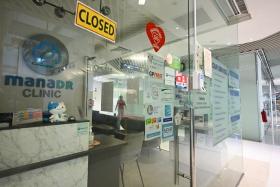Erectile dysfunction in younger execs rising amid Covid-19
Change in work routines from Covid-19 is leading to more stress and less sleep
Covid-19 has undoubtedly given rise to a host of health problems and side effects.
But the way the virus has upended work routines has inadvertently increased erectile dysfunction (ED) in younger executives.
In pre-pandemic times, it was termed as executive ED, caused by disturbed cortisol rhythms.
It affected those in their mid-30s and early 40s who were frequent long-distance fliers or worked irregular hours as bankers, lawyers, stock market traders.
It also affected those dealing with overseas clients and having regular contact with teammates or superiors in different continents and time zones.
It has become more prevalent since the onset of Covid-19, with an increase in men under 50 seeking medical attention for the condition.
Dr Sriram Narayanan, a senior consultant vascular and endovascular surgeon from The Harley Street Heart and Vascular Centre at Gleneagles Hospital, said he is seeing two to three patients a week for executive ED compared with just one a week previously.
He told The New Paper: "There is a strong correlation with the change in working patterns since the onset of the pandemic, which has seen more people working from home, conducting meetings via Zoom, Microsoft Teams, Skype and so on.
"This is causing a breakdown in the separation of work and home lives.
"Many of these high-fliers are actually working longer hours from home than they did in their offices.
"All that adds up to longer and more irregular working hours, more stress and less sleep."
How is executive ED different from ED that affects middle-aged men and older?
Age-related narrowing of the arteries from the deposition of cholesterol, diabetes, decreased testosterone levels and medication that they may be on for heart disease all can lead to a decreased blood flow into the pelvic organs, leading to progressive ED.
These are not the usual issues in younger men, where the veins that take blood away from the pelvic organs and back to the heart can flow too rapidly - meaning that even if they have healthy arteries with good blood flow in, it flows out too quickly to sustain an erection.
Repeated episodes of this rapidly affect their confidence and soon they cannot even initiate an erection, resulting in significant psychological distress.
How can irregular working hours, Zoom calls and stress cause ED?
They do so by disturbing sleep patterns. The production of cortisol, a key hormone in our bodies, follows a circadian rhythm - at its highest in the morning shortly after we wake up and at its lowest at night, when we should be asleep.
Staying up late, using bright artificial lighting and staring at brightly lit screens interferes with that natural daylight rhythm of cortisol.
And high cortisol levels cause the veins to go floppy, with a high and rapid outflow of blood from the veins in the pelvis.
Most people associate cortisol with stress, which is correct.
Cortisol's other role is to shut down functions not needed for the immediate flight or fight response.
So while your heart and major muscle groups get more blood and oxygen ready for action, and the part of your brain processing vision and sound are kicked into overdrive, the cortisol is signalling other unneeded systems such as digestion, immune responses and blood flow to parts like the penis to shut down.
The problem is that today's perceived stresses and threats persist.
Whether it is Covid-19, paying the bills, your manager chasing you for a report, or colleagues in Europe or the US dragging you into Zoom meetings at all hours, stress is almost constant.
So instead of coming and going occasionally and in short bursts, cortisol levels remain elevated for days, weeks and even months.
How can one correct disturbed cortisol rhythms and ensure they are in the healthy range?
If you have enough sleep, it is easier to cope with stress.
Even if you are working from home, set a cut-off time for work and stop answering your phone and opening e-mails.
Set a routine, dim the lights over the course of the evening, do not look at bright screens, including phones and TVs for an hour or more before bedtime, reduce your caffeine intake and take none after sundown at the latest.
Get The New Paper on your phone with the free TNP app. Download from the Apple App Store or Google Play Store now


